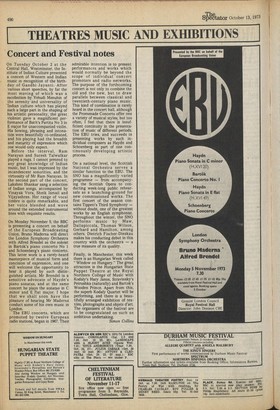THEATRES MUSIC AND EXHIBITIONS
Concert and Festival notes
On Tuesday October 2 at the Central Hall, Westminster, the Institute of Indian Culture presented a concert of Western and Indian music in recognition of the birthday of Gandhi Jayanti. After various short speeches, by far the most moving of which was a recollection by Yehudi Menuhin of the serenity and universality of Indian culture which has played such a large part in the shaping of his artistic personality, the great violinist gave a magnificent performance of Bach's Partita No 3 in E major for unaccompanied violin. His bowing, phrasing and intonation were beautifully co-ordinated, and his playing had the breadth and maturity of expression which one would only expect.
Before the interval, Ram Narayan and Suresh Talwalkar played a raga. 1 cannot pretend to any great knowledge of Indian music, but I was impressed by the incandescent sonorities, and the virtuosity of Mr Ram Narayan. In the second part of the concert, Lakshmi Shankar sang a selection of Indian songs, accompanied by Vinayak Vora, Sheik Ismail and Vijayashree. Her range of vocal timbre is quite remarkable, and her voice blended and wove around the extended instrumental lines with exquisite results.
On Monday November 5, the BBC is presenting a concert on behalf of the European Broadcasting Union. Bruno Maderna will direct the London Symphony Orchestra with Alfred Brendel as the soloist in Bartok's piano concerto No 1 and Schoenberg's piano concerto. This latter work is a rarely-heard masterpiece of musical form and concision of expression, and one will welcome the opportunity to hear it played by such distin guished artists. Mr Brendel is a sensitive advocate of Haydn's piano sonatas, and at the same concert he plays the sonatas in C minor and E flat major. I hope that we shall soon have the pleasure of hearing Mr Maderna conduct some of his own music in London.
The EBU concerts, which are promoted by twelve European radio stations, began in 1967. Their admirable intention is to present performances and works which would normally be beyond the scope of individual concert promoters and radio networks. The purpose of the forthcoming concert is not only to combine the old and the new, but to draw parallels between classical and twentieth-century piano music. This kind of combination is rarely heard in the concert hall, although the Promenade Concerts offer one a variety of musical styles; but too often, I feel that there is insufficient continuity in the presentation of music of different periods. The EBU tries, and succeeds in presenting works by such individual composers as Haydn and Schoenberg as part of one continuously developing artistic process.
On a national level, the Scottish National Orchestra serves a similar function to the EBU. The SNO has a magnificently varied programme — from accompanying the Scottish Opera to conducting week-long public rehearsals as a launching-ground for new commissioned works. The first concert of the season contains Tippett's Third Symphony — without doubt, one of the greatest works by an English symphonist. Throughout the winter, the SNO performs music by Maw, Dallapiccola, Thomas Wilson, Gerhard and Hamilton, among others. Dietrich Fischer-Dieskau makes his conducting debut in this country with the orchestra — a true measure of its quality.
Finally, in Manchester, this week there is an Hungarian Week called "Window on Hungary." The great, attraction is the Hungarian State Puppet Theatre at the Royal Northern College of Music with Kodaly's Hary Janos, Stravinsky's Petrushka (naturally) and Bartok's Wooden Prince. Apart from this, the superb Kodaly Quartet will be performing, and there is a beautifully arranged exhibition of textiles, photographs and objets d'art. The organisers of the festival are to be congratulated on such an ambitious undertaking.
Simon Collins


































 Previous page
Previous page